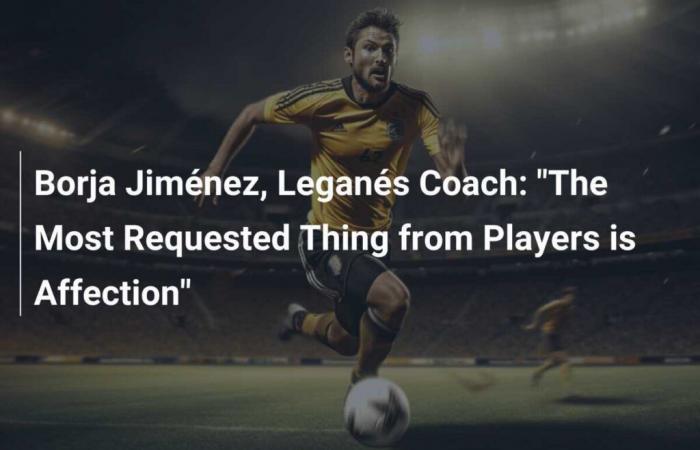“I’m not sure there is another coach in the First Division with my profile,” warns Borja Jiménez, who is in charge of Leganés as they prepare to face Madrid this Sunday (6:30 p.m., Movistar; Courtois returns) occupying 14th position, four points above the relegation zone. “At only 39 years old, without having been a professional player or having suddenly risen from a youth team, you cannot dream of coaching in the elite with my background, because it leads to frustration. My only goal was to be a coach and avoid losing money. I just I saved around 10,000 euros until the Mirandés season in 2018-19. Before that, I was barely able to make a living. I am convinced that when I joined the cadets in Valladolid at the age of 27. for 600 euros sharing an apartment with two others, my family thought: ‘What is this guy going to do?'” reflected the agile and dark-skinned coach from Ávila, who also worked for six months as an instructor at a driving school in the family business. .
Read more:
Pedro Porro, the ‘Pichichi Defender’ of the Premier League, takes revenge against a City team to which he belonged… but never played.
“I feel like my colleagues really appreciate what I do,” he proudly proclaims. He coached Ávila in Third, Izarra and Bouzas in Second B, achieved promotions with Mirandés and Cartagena to the second division, was one meter away from returning Deportivo to professional football, and last season he achieved a surprising promotion to First with Leganés . A rapid rise that, once in the elite, has led him to a conclusion: “At this level, I have encountered players who have a greater need for affection. They ask for a lot of attention, constantly. In other years in different divisions, it was the same, but not at this level. They are still children at 20 or 26 years old, often behind a facade, with substantial financial resources, but facing the same problems as the rest,” Jiménez confesses. “That is what they ask most of a coach because they already have talent. When they don’t play, you need to give them that support so that they can continue waiting for their opportunity. And if they play, it is to prevent them from interpreting that they may be guilty of something,” explains this degree in Education who has worked with a coach for the past two years to “organize his mind” and handle such situations.
Read more:
Villarreal-Osasuna: From a ‘war report’ to the ‘battle of the match’ in El Sadar
For all this, the coach highlights that he benefits from something that is often seen as a disadvantage: his youth and the fact that he has never played professionally. “99% of footballers’ experiences are based on being players. And in their circles, which are large, they already have enough people linked to football. Those of us who have not played have had different experiences. The reality is that football, At these levels, it’s about management,” he says as he sits in a classroom chair at the Leganés training facility.
While personal interactions have become increasingly valuable in his approach to football, the emphasis on tactics has been nuanced. Especially in First. “I love it; I spend hours on the board, we give it immense importance because it gives us security, but in the end, it is not so critical. The lower the level of the footballers, the more evident the coach’s hand is. For example, The Second is a very technical category. Everything is very even, and the differences come from the strategy. But in First, there is not as much influence. You need to put the good players in positions where they can do damage. Before, I had more doubts, but now. I am clear that football belongs to the players,” he says. Jiménez, who despite this evolution, maintains an unchanged routine: he personally edits the videos of the opponents that he shows to the players.
Read more:
Seville vs. Rayo Vallecano: No Excuses, That’s the Mantra
“I need to have everything under control, or at least believe that I have it, see it with my own eyes to be sure and transmit it to the players,” he admits. A task that, he points out, has also helped him gain the trust of the players. “They often look forward to the break to see what we say because they know that will change the result. That happened last season. They have normalized the idea that there can be one or two early changes. And if you get it right, they stay,” he says Borja Jimenez.
Read more:
If It Doesn’t Work, Change It
In an ideal world, he would like a team that is “very dominant and aggressive defensively,” but he recognizes that his teams play “how they can” rather than how they want to. “Last season, we defended a lot with a low block, and the players were very comfortable. It gave me a certain insecurity, but not them. So, I learned to have confidence. This season, we defend much further from our goal because the team feels that close to the area, with more talent on the field, the chances of conceding increase. We are the same team, but we do it differently,” says the Ávila-born player, who frequently trained with Andoni Iraola at Rayo during his only ones. months of unemployment early 2021, after his time in Cartagena. “With him, I realized that the current coaching staff is very numerous, and that you don’t need so many people on the field because it can be a distraction. His coaching staff was only four people with the players,” he details.
Read more:
Brahim, Academy Graduate and Golden Opportunity
Among the dozen signings made to face the Primera, none attracted as much attention as the last-minute loan of Sébastien Haller from Dortmund. He was surprised too. “I was very surprised. I was not aware of his arrival until it became official,” admits Borja Jiménez before his first meeting with Madrid. “During these days, my friends call me and ask me what I’m doing. ‘Well, analyzing Madrid,’ I answer. I take a little distance, and in fact, I talk about it and I get excited,” concludes the coach.






